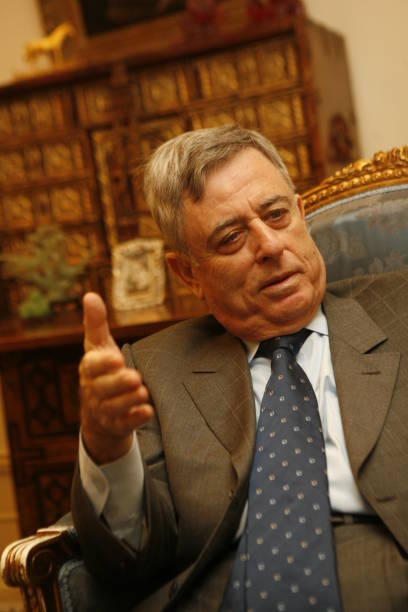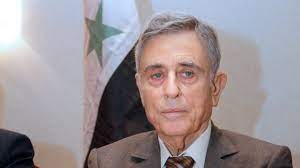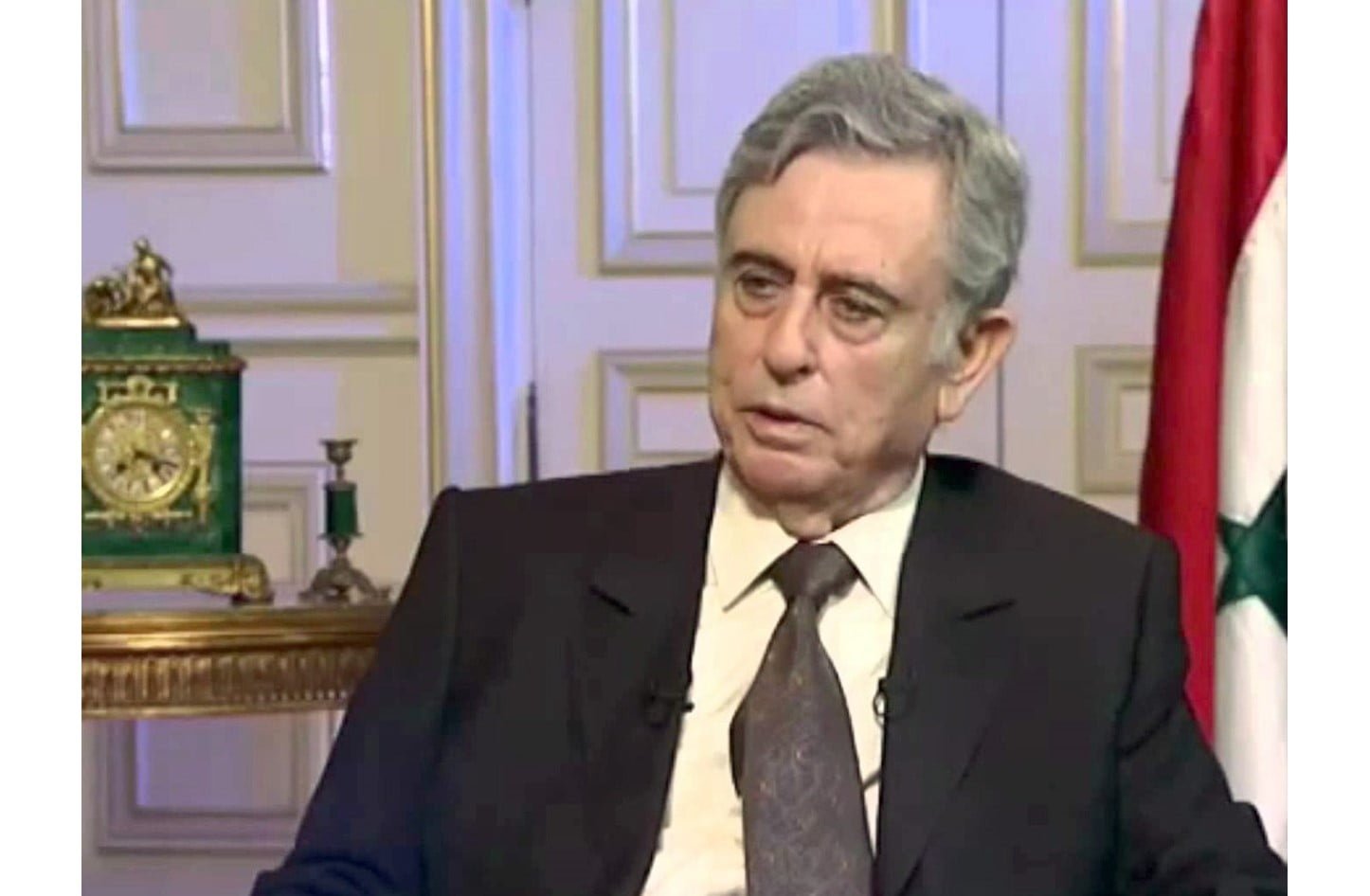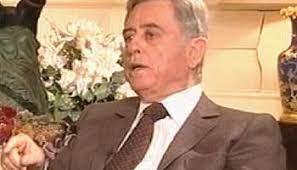Hello to our viewers in a new episode of “Today’s Talk.” Today, our discussion will be about Syria with someone who is well acquainted with the regime managing the current crisis in Syria. Our guest for today is one of the pillars of the former regime, the former Vice President of Syria, Mr. Abdul Halim Khaddam. Mr. Abdul Halim Khaddam, thank you for hosting us, and we welcome you to the “Russia Today” screen.
Hello and welcome.
First, we want to understand how the regime in Damascus is managing this crisis? Or who is managing this crisis in Damascus?
The current crisis in Syria is managed by Bashar al-Assad, of course, with the assistance of his brother Maher and also his cousin’s son Rami. This means there is a circle of the ruling family around Bashar, but the decision-maker is Bashar, and he is the one in control.
But on what basis are they managing this crisis?
In order to identify the issue of treatment, we must determine the identity of the regime. This regime is fundamentally a security system. Every totalitarian system is a security-based system that relies on security institutions to maintain power, not on popular or constitutional institutions to protect power. Thus, any fear of power loss always resorts to security institutions. This has happened in all countries ruled by totalitarian regimes in Arab, African, and Asian countries, as well as in Europe during the fascist and Nazi stages, and in the Soviet Union during the communist rule. Totalitarian rule always has its nerve center and tool in the security apparatus, and all its reactions come within this framework. This means when a problem occurs, the state or responsible institutions do not address the problem with its real causes and components; they address it through excision. Therefore, it is not surprising at all, and we should not be surprised if the treatment is security-oriented rather than political when someone talks about where the political treatment will lead. The people want to transition to a democratic system. What does a democratic system mean? It means that power returns to the people, that the president is not the source of decisions, not the one with the word, but the constitutional institutions derived from the people. Therefore, a responsible person in a security system, in a totalitarian system, cannot address the roots of problems; he tries to address them through cutting and amputation, not by addressing the roots and causes.
It has been said that there is internal disagreement within the ruling family on how to manage this crisis. Do you have any information on the matter?
There is no consideration within the regime for a political solution because the nature of the regime—the totalitarian nature of the regime—is a security-oriented nature. There is no inclination for anyone at the top of the regime or within its tools to think about a political solution. (The ideas proposed by Bashar al-Assad, some of which are reform-oriented) What happened? He mentioned the repeal of the emergency law—good, repealing the emergency law. But is the emergency law the one that goes down to the streets and kills people? On the second day of announcing the repeal of the emergency law, what happened? Dozens were killed in Syria.
The government claims that there are armed groups responsible for killing people!
This is a security regime, and it is one of the most stringent and controlling security systems in the Arab world. If a person is present in a café with a friend, having a cup of coffee, there will be a nearby third party writing a report. How can anyone imagine that there are armed groups and gangs in Syria, and the security system is inactive? There is an artificial Salafi organization created by the regime called Fatah al-Islam, which it established and sent to the Nahr al-Bared camp in Lebanon. Other than that, there have been no signs in Syria of Salafi organizations. The Syrian people are religious, both Muslims and Christians, but neither is fanatical; Syrians, by nature, are not fanatical.
So, in your opinion, who is killing people?
The regime is killing people. They say criminals are killing people, and then the army intervenes. Did the shabiha or gangs enter the security circles and torture and kill those children we saw on TV? This talk is a cover-up for the crime. I know most cities in Syria and know the composition of their populations. I tell you very clearly, if there were people in Syria who wanted violence, the army wouldn’t be able to enter a city, and I assure you that in all Syrian cities and villages, if there were acts of violence, the citizens could easily control the army’s tanks. The Syrian people are not a cowardly people; the Syrian people are a brave people, and their courage is evident in their patience in the face of oppression, not in reactive actions.
Do you see that the regime still controls the situation in Syria?
The security regime has lost control of the streets, and now there is a deep gap between the regime and the Syrian people. There is no city in Syria that the army hasn’t invaded, killing its residents, arresting and humiliating people, committing atrocities, and violating dignity. There is an unprecedented popular resentment in Syria, and this resentment can only be relieved by the fall of the regime. This regime is finished. Anyone defending this regime is a loser, playing a losing game. The bet should be on the people, not on the killers.
If you’re saying that the regime has indeed ended, what is it currently relying on? How does it remain resilient until now?
What does it do? Does the state in Syria manage people’s affairs? Is there now an authority to handle the basic aspects of citizens’ lives? The economy is crippled, on the brink of collapse, goods are missing from the markets, industries are paralyzed, trade is halted, and unemployment is rampant. Therefore, the regime doesn’t persist as a holder of the state; it persists as a holder of military force that enables it to kill, arrest, etc. However, it cannot manage the state. Can it stop the economic collapse? Absolutely not. On the contrary, with the continuation of this economic oppression, the Syrian economy has reached the edge. The state is on the verge of bankruptcy, with the budget deficit now exceeding 70%. The army’s movements in Syria consume the entire budget. Printing and dealing with cash—what does this mean? Rising prices, increased suffering for the people, and an escalation of the crisis. The regime doesn’t manage the state; it manages its crisis by using force, but it’s on a known path where it will reach: the overthrow of the regime and the accountability of all those involved in these crimes.
You talk about overthrowing the regime, who will overthrow the regime? The army, the street, a certain political class, or perhaps a certain social class in Syria?
The one who will overthrow the regime is the Syrian people. Any entity moving towards overthrowing the regime is moving with the breath of the Syrian people. In Eastern European countries, it wasn’t the armies that overthrew the regime; it was the people who brought down the systems.
This is your view, but do you have information about specific movements within the army or specific movements within Syrian political circles?
The army, fundamentally, is established to protect the homeland, defend the nation, and safeguard the people. However, at a certain stage, the army transforms. I mean, the political ideology of the army has shifted towards being an ideological army, a partisan army, protecting the regime. This shift has had very negative effects on the structure of the army. In the past, military colleges were open to everyone. Now, military colleges are not open to everyone. Consequently, the army’s structure plays a significant role. Nevertheless, I can say that not all of the army is unified around the approach the regime is taking. Undoubtedly, the Syrian army is a large army.
Do you expect a military coup to happen?
No, I am not talking about a coup, but I am saying that the entire army does not share the same direction. There are many officers who feel bitterness and concern, but they currently do not have the ability to act because they are all under surveillance, and anyone who moves faces execution without trial.
Statements have been attributed to you indicating the possibility of forming a transitional government. How accurate is this information?
I did not say there is an organization forming a transitional government. What I said is that inside Syria, not within the external opposition, there are ongoing communications to establish a structure to unify the forces of the revolution and its supporters towards managing everyone’s participation in the revolutionary process during the fall and in the transitional phase. That’s what I said, because forming a transitional government requires having a liberated area, and no state is willing to allow another state to place a temporary government on its territory.
And who participates in forming this structure inside Syria?
Talking about names means assassinating those names. Anyone whose name appears in the announcement, that’s a death sentence for them. Syria has a proud people with high qualifications, deep national spirit. Those involved in these consultations are politicians, and some are from the younger generation, but all of them aspire in one direction, which is the circle of the revolution.
Is Mr. Abdul Halim Khaddam part of this future structure?
I am abroad. I encourage and have called on all my Syrian friends to focus on national unity, unity of opposition forces inside, and unity of action and organization.
There are those who say that Syrian President Bashar al-Assad is a young, open-minded leader who studied in the West, and it’s hard to imagine that he is the one giving orders to kill his people?
First, Bashar al-Assad did not study in the West. His father sent him for training – he is an ophthalmologist – to a hospital in Britain, and he stayed for a few months before returning to Syria after the death of his brother. Second, it is not necessarily the case that someone who studies in the West becomes a democratic, progressive, and modern leader. Zine El Abidine Ben Ali, for example, trained in the West in military science, studied military science in the West, and lived in the West under the protection of Western states. Did this make him, deep down, a democratic man? Absolutely not.
You believe that the end of this crisis is the overthrow of the regime. When can we expect to see this end?
Certainly, it is not about predictions; it depends on the evolution of events. The evolution of events will inevitably lead to the fall of the regime, but where (when)? It could be in a week, it could be in a month, or it could be in two months or more. This is a struggle between forces that want life, that want light, and a group that wants darkness, oppression, and control over people’s lives.
Correct, there have been international criticisms of the regime in Syria, but these criticisms have not reached the point of convincing or pressuring the regime in Damascus enough to change its policy towards the protesters. To what extent does the international stance contribute to the regime’s persistence in its policy towards the protesters?
Certainly, after the start of the revolution, there was international indifference. Then the situation moved to expressing concern, then to condemnation. Then there were statements that this regime, in its behavior, is no longer capable of leading Syria. Therefore, as we heard in various statements from Western officials, it became a destabilizing factor in the region, not a stabilizing factor. But why didn’t the international community take decisive action? The real answer is simple, the Russian stance. The Russian government is the problem. The issue is that time always precedes them. It’s estimated that this regime won’t be able to continue. The Russians should be more knowledgeable about the nature of the Syrian people, as there has been a long-standing relationship between Syria and the Soviet Union. These relations were not only between governments; they extended to the streets due to Soviet aid, support, and positions that were more advanced than those of the West. Consequently, there are tens of thousands of Syrians who studied and learned in Soviet and Eastern European universities. There are thousands of experts who, over a long period, numbering in the tens of thousands, have passed through Syria, knowing the reality of Syria and how the Syrian people think and live. The Russian leadership should have realized that this people can only reach its rights…
If the regime falls tomorrow, who will take charge of Syria?
Syria has a population of 23 million, and it is known that it was at the forefront as a country of competence. There is no group in Syria managing the state other than these five criminals who are in power over the country! So, whoever wonders who will manage Syria, who will run the country? It is practically insulting to the Syrian people. The Syrian people are not represented by these individuals. These killers are not role models, and not even Syrians, including those around them, believe in that.
Mr. Abdul-Halim Khaddam, the former Vice President of Syria. Thank you.




